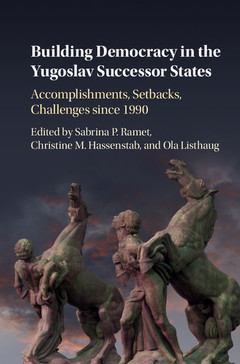Building Democracy in the Yugoslav Successor States Accomplishments, Setbacks, and Challenges since 1990
Langue : Anglais
Coordonnateurs : Ramet Sabrina P., Hassenstab Christine M., Listhaug Ola

A comprehensive analysis of how the Yugoslav successor states have coped with the challenges of building democracy since 1990.
Building democracy in societies that have known only authoritarian rule for half a century is complicated. Taking the post-Yugoslav region as its case study, this volume shows how success with democratisation depends on various factors, including establishing the rule of law, the consolidation of free media, and society's acceptance of ethnic, religious and sexual minorities. Surveying the seven successor states, the authors argue that Slovenia is in a class by itself as the most successful, with Croatia and Serbia not far behind. The other states - Bosnia-Herzegovina, Macedonia, Montenegro, and Kosovo - are all struggling with problems of corruption, poverty, and unemployment. The authors treat the issue of values as a policy problem in its own right, debating the extent to which values have been transformed by changes in education and the media, how churches and women's organisations have entered into the policy debate, and whether governments have embraced a programme designed to effect changes in values.
Table of contents; Preface; List of tables; Part I. Introduction and Theory: 1. The challenge of democratization: an introduction Sabrina P. Ramet; 2. Post-Yugoslav patterns of democratization Florian Bieber; 3. The importance of tolerance: intolerance and its consequences in the Yugoslav successor states Zachary T. Irwin; 4. Institutional trust in the Yugoslav successor states: a comparative approach Karin Dyrstad and Ola Listhaug; 5. Political culture in the Yugoslav successor states Andrej Kirbiš and Sergej Flere; 6. The impact of the ICTY on democratization in the Yugoslav successor states Jovana Mihajlović Trbovc and Vladimir Petrović; Part II. Country Studies: 7. Building democracy in Serbia: one step forward, three steps back Jelena Subotić; 8. Building democracy in Croatia since 1990 Dunja Melčić; 9. A durable oligarchy: Bosnia and Herzegovina's false postwar democratic transition Kurt Bassuener; 10. Liberal democracy in Slovenia: from seventh heaven to the lobby of hell in only two decades Alenka Krašovec and Sabrina P. Ramet; 11. Macedonia's post-Yugoslav reality: corruption, wiretapping, and stolen elections Sabrina P. Ramet; 12. Building democracy in the Western Balkans: the case of Kosovo Vladimir Đorđević; 13. The trajectory and parameters of democratic transition in Montenegro Kenneth Morrison; 14. Building democracy in Vojvodina Angela Ilić; Part III. Conclusion: 15. Where does Europe end? A conclusion Christine M. Hassenstab; About the editors and contributors; For further reading.
Sabrina P. Ramet is a Professor of Political Science at the Norwegian University of Science and Technology (NTNU), Trondheim. She is also a member of the Royal Norwegian Society of Sciences and Letters, a member of the Norwegian Academy of Science and Letters, and a Research Associate of the Science and Research Centre of the Republic of Slovenia. She is the author of twelve scholarly books, among them, Thinking about Yugoslavia: Scholarly Debates about the Yugoslav Breakup and the Wars in Bosnia and Kosovo (Cambridge, 2005) and The Three Yugoslavias: State-Building and Legitimation, 1918–2005 (2006). She is also editor or co-editor of thirty-two previous books, including Central and Southeast European Politics since 1989 (Cambridge, 2010) and Religion and Politics in Post-Socialist Central and Southeastern Europe (2014). Her articles have appeared in Foreign Affairs, World Politics, Slavic Review, and other journals. As an undergraduate, Ramet studied philosophy at Stanford University, California and subsequently received her PhD in political science from the University of California, Los Angeles in 1981.
Christine M. Hassenstab is a retired attorney, who also worked as an Adviser in the EU Grants Office at the Norwegian University of Science and Technology (NTNU), Trondheim. She earned her BA in History from the University of Washington, her JD from Golden Gate University School of Law, California, and her PhD in Sociology from NTNU in 2010. She worked as a Public Defender in King County, Washington, from 1987 to 2001, and is the author of Body Law and the Body of Law: A Comparative Study of Social Norm Inclusion in Norwegian and American Laws (2015), and co-editor of Gender (In)equality and Gender Politics in Southeastern Europe: A Question of Justice (with Sabrina P. Ramet, 2015).
Ola Listhaug, is Professor of Political Science in the Department of Sociology and Political Science at the Norwegian University of Science and Technology, Trondheim, and a Seni
Christine M. Hassenstab is a retired attorney, who also worked as an Adviser in the EU Grants Office at the Norwegian University of Science and Technology (NTNU), Trondheim. She earned her BA in History from the University of Washington, her JD from Golden Gate University School of Law, California, and her PhD in Sociology from NTNU in 2010. She worked as a Public Defender in King County, Washington, from 1987 to 2001, and is the author of Body Law and the Body of Law: A Comparative Study of Social Norm Inclusion in Norwegian and American Laws (2015), and co-editor of Gender (In)equality and Gender Politics in Southeastern Europe: A Question of Justice (with Sabrina P. Ramet, 2015).
Ola Listhaug, is Professor of Political Science in the Department of Sociology and Political Science at the Norwegian University of Science and Technology, Trondheim, and a Seni
Date de parution : 05-2017
Ouvrage de 472 p.
15.9x23.5 cm
Disponible chez l'éditeur (délai d'approvisionnement : 14 jours).
Prix indicatif 102,80 €
Ajouter au panierThème de Building Democracy in the Yugoslav Successor States :
© 2024 LAVOISIER S.A.S.



